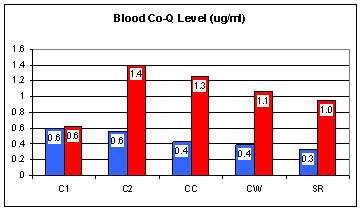
Return to Bioenergetic Support Page
Co-Enzyme Q10 in Open Heart Surgery
Co-Enzyme Q10 in Bypass Surgery - Basic Concepts
Co-Enzyme Q10 in High Risk Bypass Surgery
Co-Enzyme Q10 in High Risk Bypass Surgery
Co-Enzyme Q10 in Bypass Surgery - Basic Concepts
If you need open heart surgery, going in to the procedure you
will likely be CoQ10 deficient. I can predict this because:
· Recurrent coronary
insufficiency leads to CoQ depletion, so patients with advanced disease are
going to be CoQ deficient, and
· Statin drugs waste Co-Q and you will likely
be on one, but most likely you will not be on concomitant CoQ supplementation.
Post-operatively your blood and CoQ levels will be even lower,
as:
· The free radical
stress and transient cardiac oxygen deficiency that accompany bypass burns off
Co-Q, and
· You will not be given Co-Q during your
post-bypass hospital stay, so:
Bypass Surgery is a Low CoQ10 Situation
This is unfortunate, as you need CoQ10 to generate energy. Without CoQ10, all the oxygen and sugar and fat and drugs and medical attention that you receive will not be enough; your heart will remain energy deficient and relatively dysfunctional, relative to what it could be if you were supplemented with Co-Q10 before and after the procedure. Not supplementing pre-bypass coronary patients with Co-Q makes little sense to me. Please note, I am not anti-bypass surgery. I send lots of patients to bypass surgery. I am against sending patients to a $50,000 procedure that carries risk without putting them on $1/day nutritionals that lower that risk, get them out of the hospital quicker, and improve outcome. While this page focuses on CoQ10, other studies with other nutritional supplements have shown the same thing. Combining the best of surgical/drug medicine with the best of nutritional medicine, the practice of integrative cardiology, is what we are all about. Let's now look at a few of the studies that support the use of CoQ10 in patients undergoing open heart surgery.
Co-Enzyme Q10 in High Risk Bypass Surgery
Twenty patients at high risk for a complication of bypass surgery - age above 65, ejection fraction < 35% (the percentage of blood ejected by the heart with each beat, normal is ≥ 50%), and a CoQ10 level < 0.6 (desirable is ³ 2) - were randomized to receive:
· Usual therapy plus placebo, 14 days pre
through 30 days post-bypass
· Usual therapy plus CoQ10 100 mg/day over the
same time period
Blood CoQ10 levels rose with supplementation. In the charts below, C1 refers to the CoQ10 level at the time of angiography, carried out two weeks before bypass surgery. C2 refers to the CoQ10 level at the time of surgery. CC refers to events occurring during surgery, when the heart is "on ice", CW to the immediate post-op state, as the heart is being removed from bypass, and SR to events occurring in the post-op surgical recovery room.


CoQ10 levels rose between C1 and C2 in the supplemented (red) group, but remained low in the placebo (blue) group, not a surprise. The on-treatment level of 1.4 isn't optimal, but it's all you are going to get with just two weeks of supplementation. In both groups, the blood CoQ10 level fell with the stress (free radical, inflammatory, nutritional, and ischemic stress) of surgery, but it fell a lot less in the supplemented group. C0Q10 blood levels rebounded during the 30 day recovery period, but obviously much faster, and to a greater degree, in the supplemented group. This all makes sense, but what effect did oral supplementation have on heart tissue CoQ10 levels? What effect did this have on cardiac energy production?
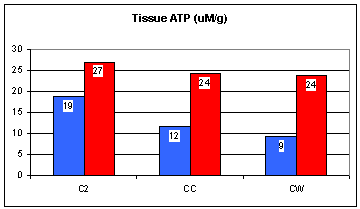
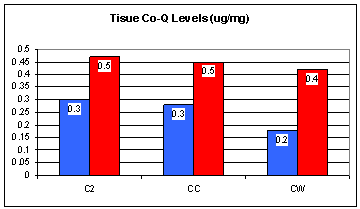
Heart tissue levels were not obtained at C1, at the time of the coronary angiogram, but they were obtained at three time points during bypass surgery, and you can see that oral CoQ10 supplementation increased the content of CoQ10 within the heart tissue, and second, that the stress of surgery depleted heart tissue CoQ10 in the placebo treated patients, but less so in the supplemented group. The goal of bypass surgery, as well as the goal of everything anyone in cardiovascular medicine attempts to do for you, is to increase the content (and your ability to regenerate) ATP within the cells of the heart. With just two weeks of supplementation, heart ATP levels rose with supplementation. This is a critical piece of science. How would you like to be going into a high risk surgery, in the high cardiac ATP content group, or with low ATP because your care was confined to drug therapy alone? ATP levels actually fell during bypass surgery (a situation that can be blunted with Ribose, discussed elsewhere on this site), but they fell a lot less in the surgical patients who were treated with CoQ10. The heart needs energy, ATP energy, to pump effectively, so what effect did CoQ10 supplementation have on ejection fraction, the percentage of blood filling the heart that is actually ejected forward with each beat?

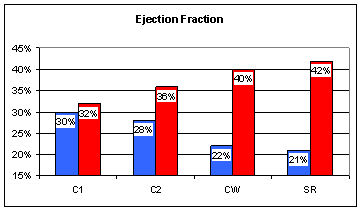
Ejection fraction falls as a direct consequence of bypass surgery, related directly to the loss of ATP that accompanies this procedure. This is why patients may struggle in the surgical recovery room, even thought the surgery was a technical success. This temporary loss of heart tissue ATP leaves you with a stiff, poorly contractile heart; thus you may require diuretic therapy to clear fluid from your lungs, or inotropic (adrenaline like agents that stimulate the heart to pump harder) therapy for a period of time. If blood flow to the kidney falls off, temporary dialysis may be required. But if you are treated with CoQ10, ATP levels don't fall as much, your ejection fraction doesn't fall; rather it rises by the time you hit the recovery room, and it remains higher than in non-supplemented patients during your entire hospital stay. So what affect does all this have on your outcome?
In the placebo group, their post-operative course was complicated, as expected. All needed IV inotropic support. Intra-aortic balloon pump (the invasive equivalent of EECP) support was required in four, and dialysis in three. All ten experienced a cardiac rhythm disturbance. Recovery time was 15-30 days and two of the ten died of post-operative pump failure.
In the CoQ10 group, recovery was uncomplicated over 3-5 days, arrhythmia was infrequent, none of the ten patients required the balloon pump or dialysis, and none died. This incredibly powerful study has been ignored in American medicine, which tends to ignore science that does not support drug use and surgery. The only honest reason to ignore this study is that it was a small study, involving only twenty patients, so...
Co-Enzyme Q10 and Energy Production During Bypass Surgery
One hundred and twenty two patients scheduled for coronary artery bypass surgery (CABG) were randomized to receive CoQ10 at a dose of 300 mg/day or placebo over two weeks immediately preceding their procedure. Heart muscle samples were obtained at the time of surgery.
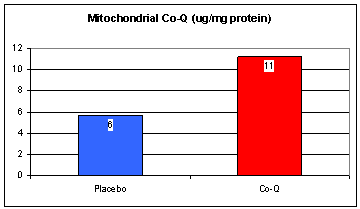
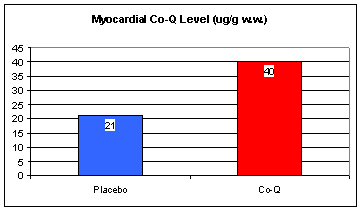
With supplementation, myocardial (heart) tissue CoQ10 levels rose, not a surprise, and the supplemented CoQ10 found its way into the mitochondria, the regions within the cells (organelles) where sugar and fat are converted in to ATP energy.
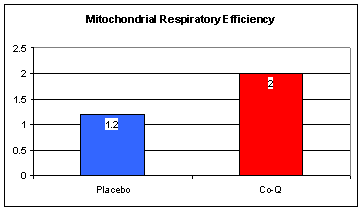
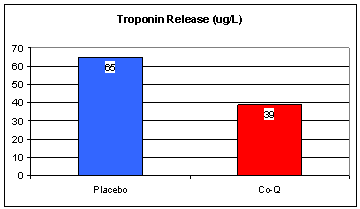
Mitochondrial respiratory efficiency, the ability of the mitochondria to generate ATP after 30 minutes of ischemia (oxygen deficiency, as occurs during on-pump CABG), was improved with CoQ supplementation. Troponin is a "cardiac enzyme", a protein found only in the heart, that is released in to the circulation when heart cells die. A rise in troponin is used as a criteria in the diagnosis of heart attack. Some heart muscle damage occurs in the course of cardiac surgery - it is inevitable and usually minor - but less damage occurred in the CoQ10 treated patients.
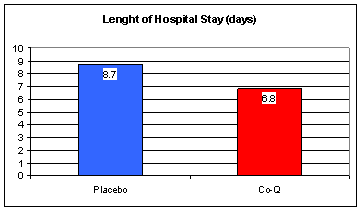
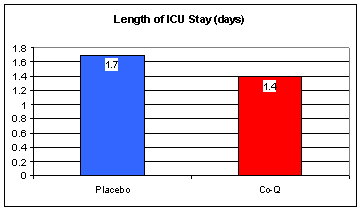
This study was designed to look at metabolic function, not outcome, but they did look at several parameters of cost-effectiveness, which is becoming increasingly important as the cost of health care (or rather disease care) is bringing our manufacturing sector to its knees. The CoQ10 treated patients got out of the ICU quicker, and they left the hospital a full two days before their placebo treated comrades. A day in the hospital costs a lot of money, so two days saved saved a whole lot of money.
So I recommend that you take CoQ10 if you need CABG. I recommend that you be given CoQ10 while you are in the hospital. In Toledo, Ohio, your family will have to sneak it in to you, as it is against hospital policy for a patient to receive CoQ10. Thus I will work hard to minimize your need for hospital based care. That is all that I as an individual physician can do. You, the consumer of health care, can demand of your doctors that you receive CoQ10, and threaten to take your health business elsewhere if you are denied. Maybe that will get something done.